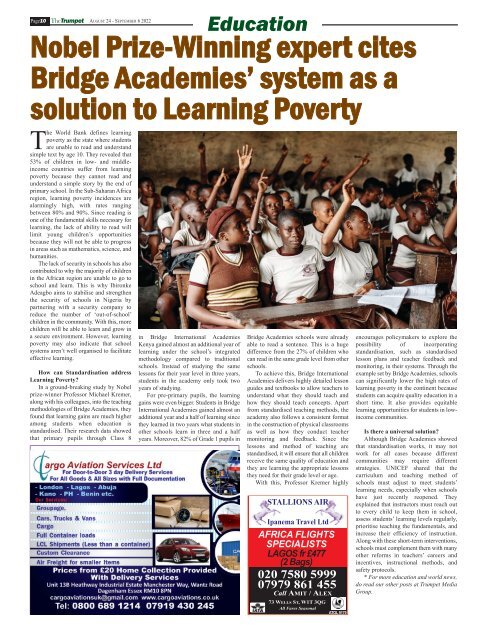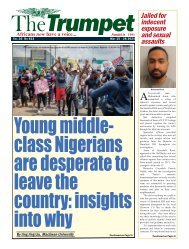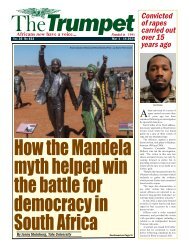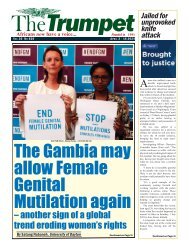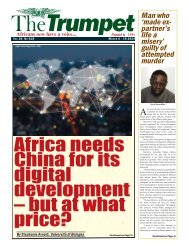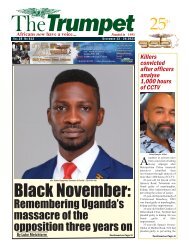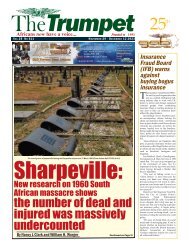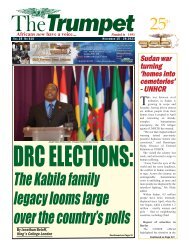The Trumpet Newspaper Issue 578 (August 24 - September 6 2022)
Human rights abuse in Equatorial Guinea. Missing Owami Davies found. Black celebrities back Bowel Cancer screening campaign.
Human rights abuse in Equatorial Guinea.
Missing Owami Davies found.
Black celebrities back Bowel Cancer screening campaign.
Create successful ePaper yourself
Turn your PDF publications into a flip-book with our unique Google optimized e-Paper software.
Page10 <strong>The</strong><strong>Trumpet</strong> AUGUST <strong>24</strong> - SEPTEMBER 6 <strong>2022</strong><br />
Education<br />
Nobel Prize-Winning expert cites<br />
Bridge Academies’ system as a<br />
solution to Learning Poverty<br />
<strong>The</strong> World Bank defines learning<br />
poverty as the state where students<br />
are unable to read and understand<br />
simple text by age 10. <strong>The</strong>y revealed that<br />
53% of children in low- and middleincome<br />
countries suffer from learning<br />
poverty because they cannot read and<br />
understand a simple story by the end of<br />
primary school. In the Sub-Saharan Africa<br />
region, learning poverty incidences are<br />
alarmingly high, with rates ranging<br />
between 80% and 90%. Since reading is<br />
one of the fundamental skills necessary for<br />
learning, the lack of ability to read will<br />
limit young children’s opportunities<br />
because they will not be able to progress<br />
in areas such as mathematics, science, and<br />
humanities.<br />
<strong>The</strong> lack of security in schools has also<br />
contributed to why the majority of children<br />
in the African region are unable to go to<br />
school and learn. This is why Ibironke<br />
Adeagbo aims to stabilise and strengthen<br />
the security of schools in Nigeria by<br />
partnering with a security company to<br />
reduce the number of ‘out-of-school’<br />
children in the community. With this, more<br />
children will be able to learn and grow in<br />
a secure environment. However, learning<br />
poverty may also indicate that school<br />
systems aren’t well organised to facilitate<br />
effective learning.<br />
How can Standardisation address<br />
Learning Poverty?<br />
In a ground-breaking study by Nobel<br />
prize-winner Professor Michael Kremer,<br />
along with his colleagues, into the teaching<br />
methodologies of Bridge Academies, they<br />
found that learning gains are much higher<br />
among students when education is<br />
standardised. <strong>The</strong>ir research data showed<br />
that primary pupils through Class 8<br />
in Bridge International Academies<br />
Kenya gained almost an additional year of<br />
learning under the school’s integrated<br />
methodology compared to traditional<br />
schools. Instead of studying the same<br />
lessons for their year level in three years,<br />
students in the academy only took two<br />
years of studying.<br />
For pre-primary pupils, the learning<br />
gains were even bigger. Students in Bridge<br />
International Academies gained almost an<br />
additional year and a half of learning since<br />
they learned in two years what students in<br />
other schools learn in three and a half<br />
years. Moreover, 82% of Grade 1 pupils in<br />
Bridge Academies schools were already<br />
able to read a sentence. This is a huge<br />
difference from the 27% of children who<br />
can read in the same grade level from other<br />
schools.<br />
To achieve this, Bridge International<br />
Academies delivers highly detailed lesson<br />
guides and textbooks to allow teachers to<br />
understand what they should teach and<br />
how they should teach concepts. Apart<br />
from standardised teaching methods, the<br />
academy also follows a consistent format<br />
in the construction of physical classrooms<br />
as well as how they conduct teacher<br />
monitoring and feedback. Since the<br />
lessons and method of teaching are<br />
standardised, it will ensure that all children<br />
receive the same quality of education and<br />
they are learning the appropriate lessons<br />
they need for their grade level or age.<br />
With this, Professor Kremer highly<br />
STALLIONS AIR<br />
Ipanema Travel Ltd<br />
AFRICA FLIGHTS<br />
SPECIALISTS<br />
LAGOS fr £477<br />
(2 Bags)<br />
020 7580 5999<br />
07979 861 455<br />
Call AMIT / ALEX<br />
73 WELLS ST, W1T 3QG<br />
All Fares Seasonal<br />
ATOL 9179<br />
encourages policymakers to explore the<br />
possibility of incorporating<br />
standardisation, such as standardised<br />
lesson plans and teacher feedback and<br />
monitoring, in their systems. Through the<br />
example set by Bridge Academies, schools<br />
can significantly lower the high rates of<br />
learning poverty in the continent because<br />
students can acquire quality education in a<br />
short time. It also provides equitable<br />
learning opportunities for students in lowincome<br />
communities.<br />
Is there a universal solution?<br />
Although Bridge Academies showed<br />
that standardisation works, it may not<br />
work for all cases because different<br />
communities may require different<br />
strategies. UNICEF shared that the<br />
curriculum and teaching method of<br />
schools must adjust to meet students’<br />
learning needs, especially when schools<br />
have just recently reopened. <strong>The</strong>y<br />
explained that instructors must reach out<br />
to every child to keep them in school,<br />
assess students’ learning levels regularly,<br />
prioritise teaching the fundamentals, and<br />
increase their efficiency of instruction.<br />
Along with these short-term interventions,<br />
schools must complement them with many<br />
other reforms in teachers’ careers and<br />
incentives, instructional methods, and<br />
safety protocols.<br />
* For more education and world news,<br />
do read our other posts at <strong>Trumpet</strong> Media<br />
Group.


